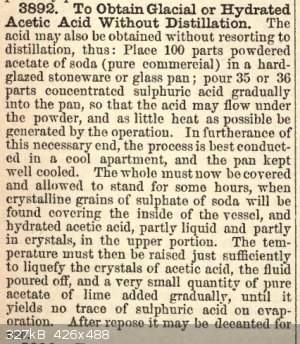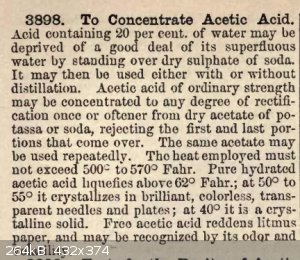| Pages:
1
2 |
Mush
National Hazard
   
Posts: 633
Registered: 27-12-2008
Member Is Offline
Mood: No Mood
|
|
Acetic acid, Vinegar, Ammonia, Alum
J. & A. Churchill
London
1885
https://archive.org/details/aceticacidvinega00londrich/page/...
|
|
|
clearly_not_atara
International Hazard
    
Posts: 2789
Registered: 3-11-2013
Member Is Online
Mood: Big
|
|
I think sodium pyrosulfate could probably be used to dehydrate acetic acid, since we already know that attempts to dehydrate GAA with this reagent
return the starting materials. At the same time, GAA should not attack bisulfate.
I imagine you want to start with reasonably concentrated acetic acid. One advantage of the method is that you could also use acetic acid contaminated
with some acetate salts.
[Edited on 1-4-2020 by clearly_not_atara]
|
|
|
dicyanin
Hazard to Self
 
Posts: 57
Registered: 29-3-2020
Location: Europe
Member Is Offline
Mood: inquisitive
|
|
I have the same problem, where I live you can readily find 80% acetic acid on the shelves of the larger hardware stores, but glacial acetic acid can
only be bought through a chemical supply house, which is more hasslesome and expensive.
I found this method in "Dick's Encyclopedia of Practical Receipts and Processes", a curious work that contains a lot of recipes for household
products, but also pyrotechnics and simple chemicals. The book can be downloaded from the Internet Archive:
https://archive.org/details/encyclopediaofpr00dick/page/n9/m...
It basically describes a method of gently pouring concentrated sulfuric acid on powdered sodium acetate with adequate cooling, letting it digest for
some time, then gently heating the mixture above the melting point of glacial acetic acid but under the melting pont of the formed sodium sulfate, and
decanting.
Then a small quantity of calcium acetate is added until there is no further precipitation of calcium sulfate. After the latter settles it is decanted
and used as is.

sic transit gloria mundi
|
|
|
dicyanin
Hazard to Self
 
Posts: 57
Registered: 29-3-2020
Location: Europe
Member Is Offline
Mood: inquisitive
|
|
And here from the same book is a method for preparing glacial acetic acid from 80% acetic acid. (page 365)
The 80% acetic acid is simply dried over anhydrous sodium sulfate.
Quote: Originally posted by JJay  |
Apparently in olden times they prepared glacial acetic acid by first distilling acetic acid from anhydrous calcium chloride and then again from
anhydrous sodium acetate, further purifying it by fractional freezing.
It's been said elsewhere on this board that copper sulfate and magnesium sulfate can be used to dry acetic acid, but I haven't seen a good writeup on
either.
|
This seems very similar to drying over sodium sulfate.
Also the CaCl2 method notes that a considerable amount of HCl is present in the acetic acid after the first distillation. I wonder on a sidenote, if
anhydrous CaBr2 is used this would be a good way to prepare an anhydrous solution of HBr in acetic acid?

[Edited on 1-4-2020 by dicyanin]
[Edited on 1-4-2020 by dicyanin]
sic transit gloria mundi
|
|
|
Refinery
Hazard to Others
  
Posts: 371
Registered: 17-2-2014
Member Is Offline
Mood: Still
|
|
This might be a dumb question, but I have GAA standing in the fridge at 6C and it is still in very liquid form. As it should freeze at 16C, should
this be cause of not having crystallization points, or something else?
I would not consider the acid bunk because it is from a reputable supplier.
|
|
|
Tsjerk
International Hazard
    
Posts: 3032
Registered: 20-4-2005
Location: Netherlands
Member Is Offline
Mood: Mood
|
|
Give it a good shake, but otherwise a very small amount of water can cause significant lowering of the freezing point.
|
|
|
draculic acid69
International Hazard
    
Posts: 1371
Registered: 2-8-2018
Member Is Offline
|
|
Quote: Originally posted by XeonTheMGPony  | FAILURE!
After siting for several weeks over calcium chloride I ended up with a viscus fuming fluid.
I loaded it into a 250ml flask and then attached a 300mm fractional column and started slow heating, during this I got white fuming from the vent.
I suspect I ended up with HCl and Calcium Acetate, I recovered some Acetic acid + water 
So I would not recommend drying with CaCl |
Is it possible that acetic acid can liberate HCL.im thinking not as this will mean that a weaker acid liberates a stronger one.usually it's the
stronger acid/base liberates the weaker one but I'm not 100% certain about this.maybe it can happen.
|
|
|
Refinery
Hazard to Others
  
Posts: 371
Registered: 17-2-2014
Member Is Offline
Mood: Still
|
|
Quote: Originally posted by Tsjerk  | | Give it a good shake, but otherwise a very small amount of water can cause significant lowering of the freezing point. |
Now it went glace. I gave it a decent shake earlier on the day. I hope it's indicator of purity. 
|
|
|
| Pages:
1
2 |